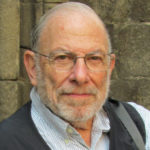 My career in broadcast journalism and documentary films includes thirty-five years at CBS News and PBS (Frontline, The American Experience, Nova).
My career in broadcast journalism and documentary films includes thirty-five years at CBS News and PBS (Frontline, The American Experience, Nova).
I started out writing and producing for daily news programs including the CBS Evening News with Walter Cronkite. Among my assignments were major news events from the space program to the World Series; and the civil rights movement, from Selma, Alabama and “Bloody Sunday” to Congress and the passage of the Voting Rights Bill.
My thirty films cover a wide range of subjects both domestic and foreign, contemporary and historical, including a multi-documentary chronicle of modern China. Major domestic topics are covered in The Guns of Autumn, You and the Commercial, The Radio Priest and Health in America, among others.
(Film and career commentaries, reviews, awards and sidebars can be viewed elsewhere on this website.)
My parents were immigrants from Tsarist Russia. They met in Charleston, West Virginia, where I was born, the youngest of three sons. My oldest brother, Sid, became a notable architect; my brother Bob, an accomplished musician: performer, composer and teacher. Our father, Joseph, was a U.S. Treasury Agent, our mother, Clara Aaron, a saint.
When I was four, we moved to Los Angeles. I attended public schools and graduated with a BA in political science from UCLA (where I was student body president (1955-56); and editor of The Daily Bruin, which received an All-America rating as one of the top five college dailies in the country).
At Harvard, I earned an MA in East Asian Studies with a specialization in China. I also taught in the Masters’ Documentary Film Program at Stanford.
My wife, Xiaoyan Zhao Drasnin, is a Stanford Ph.D. in Communication and former global polling director for New York-based GfK Roper Public Affairs. We have lived in New York City and Hong Kong, and now reside in Los Altos, CA.
On the Documentary Film
Since its earliest beginnings, the documentary film has been both controversial and honored (at times, simultaneously). Robert Flaherty’s “Nanook of the North”, often cited as the first documentary made, in fact staged scenes, manipulated its subjects, and distorted their story.
The inventor, Thomas Edison, made a documentary that claimed to show the Boxer Rebellion in China at the turn of the 20th century, but was re-created and filmed in New Jersey. Staging was the original sin of documentary filmmakers.
Too often, the documentary is used by those motivated not by facts or fairness but by partisan politics and personal agendas. But there is another tradition that goes back to the early days of television news when the three major TV networks had their own documentary units whose films were broadcast in prime time. I was privileged to be part of that era.
During that time, there was a commitment that is at the heart and soul of the documentary film’s legitimacy. At CBS News, there was a thick handbook of production standards and guidelines that covered editing, filming interviews, the use of music, the recording and use of sound, the identification of sources and pre-recorded material, the Fairness Doctrine—and staging, of which the first sentence was: “Staging is prohibited.” Documentaries were not pre-conceived or pre-scripted, they were researched and open to the process of discovery.
There was planning. You had a budget. You had to make choices. You had to choose locations, hoping to be in the right place at the right time. You had to choose who would be interviewed, who best represented different points of view. It is true, we existed as part of a money-making, commercial enterprise. But the documentary did not exist to sell you something, not a product, or an idea, or a point of view. Often, they aired without being fully sponsored and at times, without any commercials at all. In any event, advertisers were never permitted to see the film before it was broadcast.
When it came to controversial subjects, there was a premise that the documentary would cover issues:
— without prejudice, by getting as close as possible to reality, by sticking to the facts;
— by remembering that a reporter is not a protagonist and does not take sides;
— by letting people speak for themselves.
Inevitably, there arose the question of objectivity. We, all of us, are influenced by what we know and don’t know, by what we have, or haven’t, experienced. The issue is not objectivity but the need to transcend our accumulated “wisdom”, a standard of professionalism: it is intention that matters, it is fairness, it is accuracy, it is being informed, it is asking the right questions, and follow-up questions.
There are many reasons to make a documentary film, including:
— to bear witness to events or issues that matter;
— to address the historical record, our understanding of history;
— to connect the past to the present, to better understand the world in which we live;
— to expose injustice, and false narratives.
There are those who would deny even the possibility, let alone the existence, of objectivity in documentary filmmaking. I hereby claim otherwise. We may not have always fulfilled the mission, not completely, not every time, but I believe in its purpose and intention, in the documentary as journalism, as objective as humanly possible, beholden to the rules and ethics of the profession.
